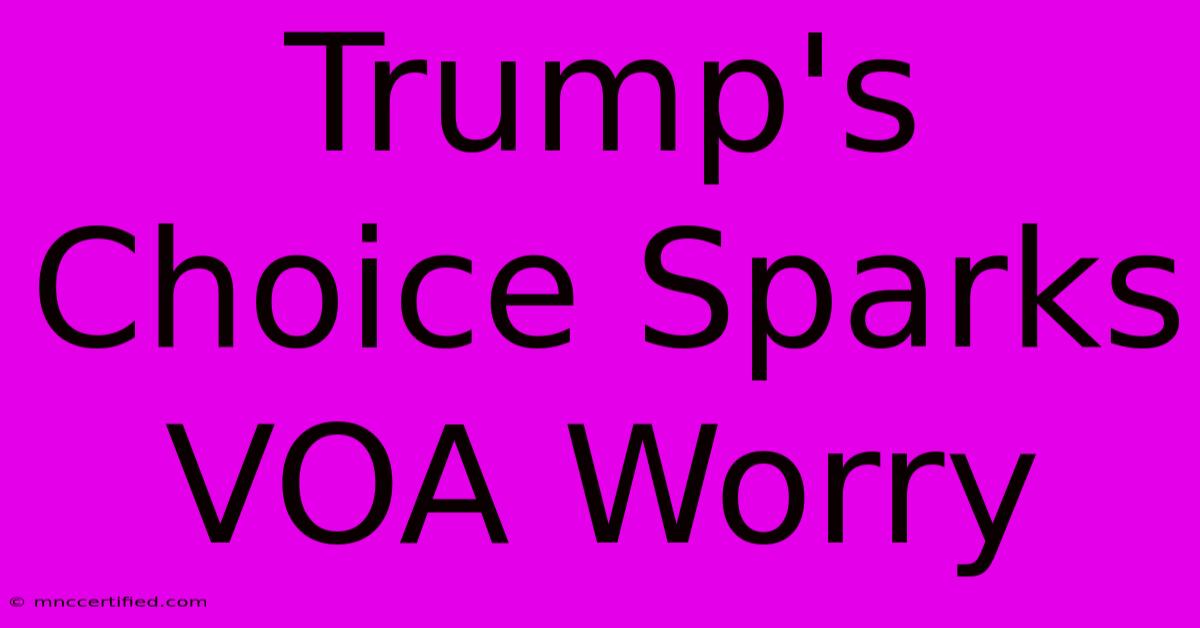Trump's Choice Sparks VOA Worry

Table of Contents
Trump's Choice Sparks VOA Worry: Examining the Implications for Journalism's Independence
The recent appointment of [Insert Name] to a key position within the Voice of America (VOA) has ignited concerns regarding the organization's editorial independence and its commitment to unbiased journalism. This appointment, made by the Trump administration [or relevant entity], has raised serious questions about the future direction of this vital international broadcaster. This article will delve into the specifics of the appointment, the potential ramifications for VOA's credibility, and the broader implications for the landscape of international media.
Understanding the Concerns: Threats to VOA's Independence
The Voice of America, funded by the U.S. government, has a long history of providing news and information to audiences worldwide. Its mission is crucial: to deliver accurate and unbiased reporting, fostering understanding and promoting democracy. However, appointments perceived as politically motivated pose a significant threat to this mission.
The appointment of [Insert Name] is particularly worrying because [Clearly state the reasons for concern. This could include the appointee's past statements, political affiliations, or lack of journalistic experience. Provide specific examples and credible sources]. This raises concerns that the appointee might:
- Influence editorial decisions: The potential for biased reporting and censorship is a major concern. A politically aligned appointee could exert pressure to favor specific narratives or suppress dissenting voices.
- Compromise journalistic integrity: The perceived lack of commitment to unbiased reporting could damage VOA's credibility and its ability to reach its diverse audience.
- Undermine public trust: If the public perceives VOA as a mouthpiece for a particular political agenda, its value as a source of credible information diminishes significantly.
The Broader Context: Political Influence on Media
The concerns surrounding this appointment are not isolated incidents. They highlight a broader trend of political interference in media organizations worldwide. The erosion of journalistic independence poses a serious threat to democratic societies, hindering open discourse and informed decision-making. [Optional: Briefly discuss other examples of political influence on media outlets globally].
Analyzing the Potential Impacts: A Bleak Outlook?
The consequences of a compromised VOA could be far-reaching:
- Decreased global reach and influence: If the audience loses trust in VOA's impartiality, its effectiveness in reaching and informing international audiences will be severely diminished.
- Weakening of soft power: VOA plays a critical role in U.S. soft power – its ability to influence global opinion through cultural and diplomatic means. A loss of credibility could weaken this important tool.
- Emboldening of authoritarian regimes: Authoritarian governments might exploit VOA's perceived lack of neutrality to further their propaganda efforts and undermine democratic values.
The Way Forward: Safeguarding Journalistic Integrity
Protecting VOA's independence requires a multi-pronged approach. This includes:
- Increased transparency and accountability: The appointment process should be more transparent, ensuring that appointees are chosen based on their journalistic experience and commitment to unbiased reporting, rather than political affiliations.
- Strengthening internal safeguards: VOA needs robust internal mechanisms to protect its editorial independence from external pressures. This might include independent oversight boards or ethics committees.
- Public advocacy and vigilance: Journalists, media organizations, and concerned citizens must actively advocate for the protection of VOA's independence and hold those in power accountable for any attempts to undermine it.
Conclusion: A Call for Action
The appointment of [Insert Name] serves as a stark reminder of the ongoing battle to protect journalistic independence and the crucial role of unbiased reporting in a democratic society. The future of VOA, and indeed the global media landscape, depends on the collective efforts of journalists, policymakers, and citizens to safeguard the integrity of this vital institution. The ongoing debate necessitates careful monitoring and a sustained commitment to upholding journalistic principles in the face of political pressures. The international community must remain vigilant in its efforts to protect the freedom of the press and ensure the continued provision of unbiased information to global audiences.

Thank you for visiting our website wich cover about Trump's Choice Sparks VOA Worry. We hope the information provided has been useful to you. Feel free to contact us if you have any questions or need further assistance. See you next time and dont miss to bookmark.
Featured Posts
-
Okami Sequel Confirmed By Kamiya
Dec 13, 2024
-
Witcher 4 Trailer Cd Projekt Confirms
Dec 13, 2024
-
Astro Bot Game Awards 2024 Winner
Dec 13, 2024
-
49ers Bosa Greenlaw Active
Dec 13, 2024
-
Brock Purdy Taylor Swift Trending News
Dec 13, 2024